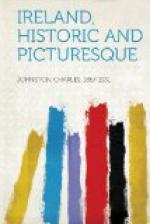There is a whole historical romance in that single picture; the passage could not easily be surpassed for direct and forcible narrative. A few years later, we come on one of the most amusing things in the whole series of annals, a perfect contrast to the grim ferocity of the feud of the O’Donells. In 1472 “a wonderful animal was sent to Ireland by the king of England. She resembled a mare, and was of a yellow color, with the hoofs of a cow, a long neck, a very large head, a large tail, which was ugly and scant of hair. She had a saddle of her own. Wheat and salt were her usual food. She used to draw the largest sled-burden behind her. She used to kneel when passing under any doorway, however high, and also to let her rider mount.” It is evident that the Gaelic language in the fifteenth century lacked a name for the camel. The same year, we are told, “the young earl of Desmond was set at liberty by the MacCarthys; he disabled Garrett, son of the earl of Kildare.”
Here is another passage which vies in vividness and force with the story of the death of Rury O’Donell: “1557: Two spies, Donough and Maurice by name, entered the camp of John O’Neill by Lough Swilly, and mingled with the troop without being noticed; for in consequence of the number and variety of the troops who were there, it was not easy for them to discriminate between one another, even if it were day, except by recognizing their chieftains alone. The two persons aforesaid proceeded from one fire to another, until they came to the great central fire, which was at the entrance of the son of O’Neill’s tent; and a huge torch, thicker than a man’s body, was continually flaming at a short distance from the fire, and sixty grim and redoubtable warriors with sharp, keen axes, terrible and ready for action, and sixty stern and terrific Scots, with massive, broad and heavy striking swords in their hands, ready to strike and parry, were guarding the son of O’Neill. When the time came for the troops to dine, and food was divided and distributed among them, the two spies whom we have mentioned stretched out their hands to the distributor like the rest, and that which fell to their share was a measure of meal, and a suitable complement of butter. With this testimony of their adventure they returned to their own people.”




